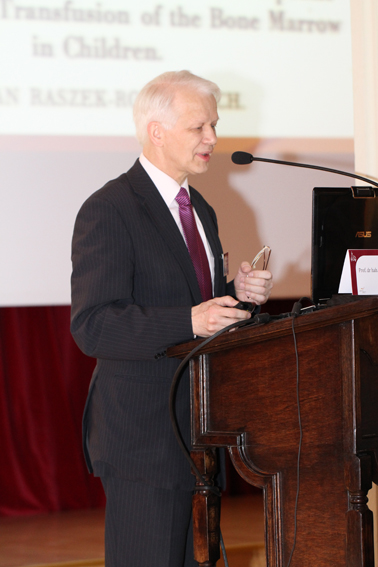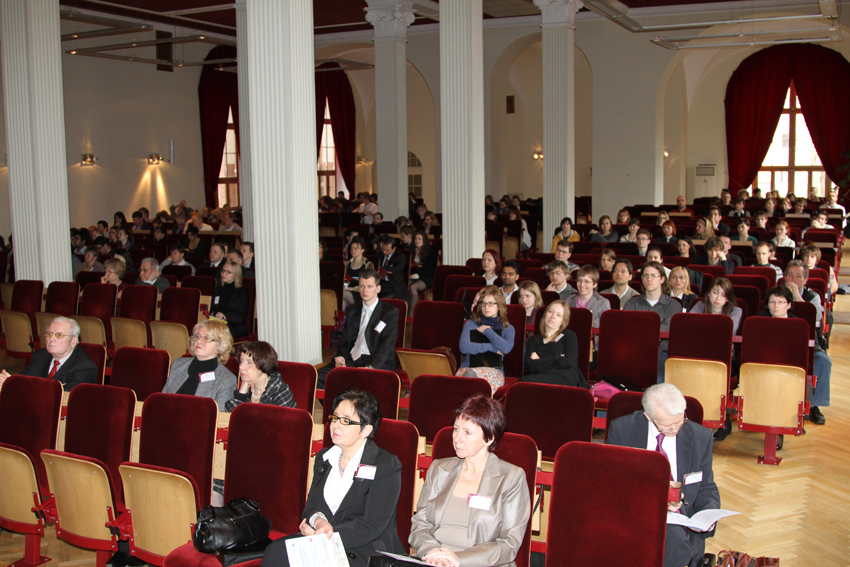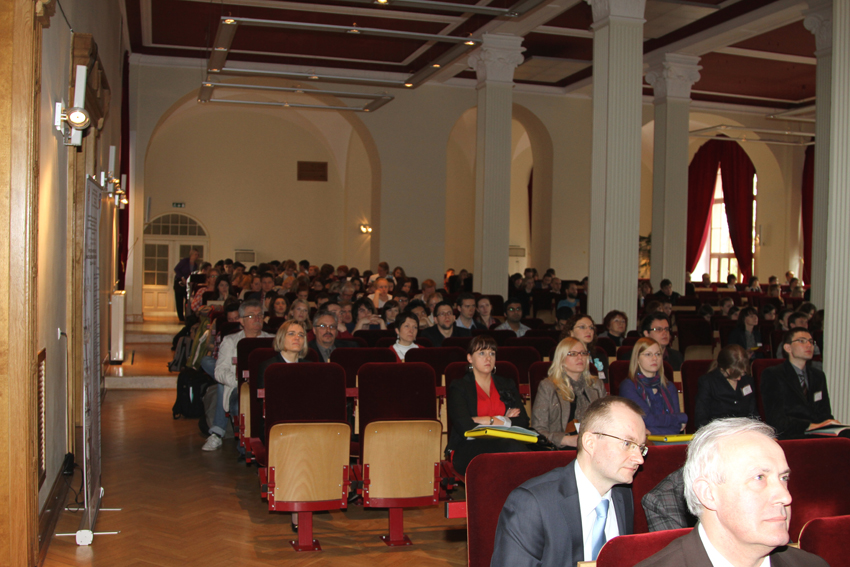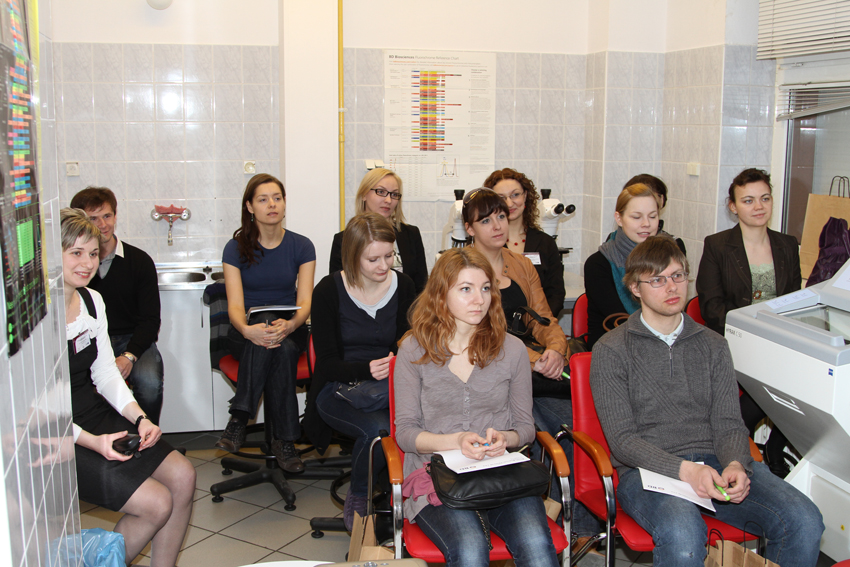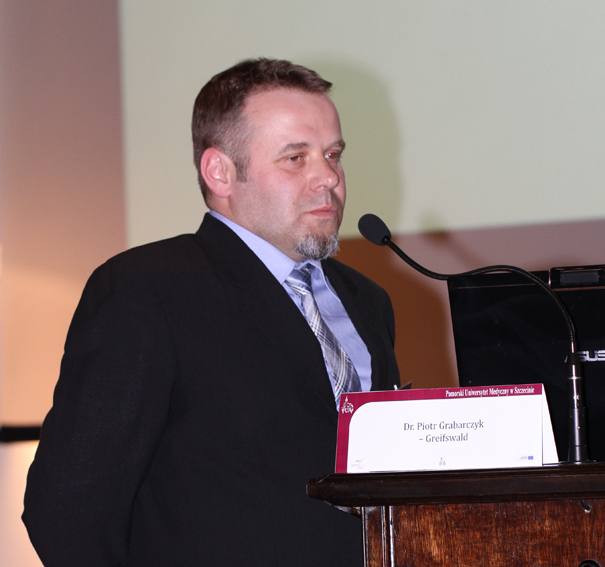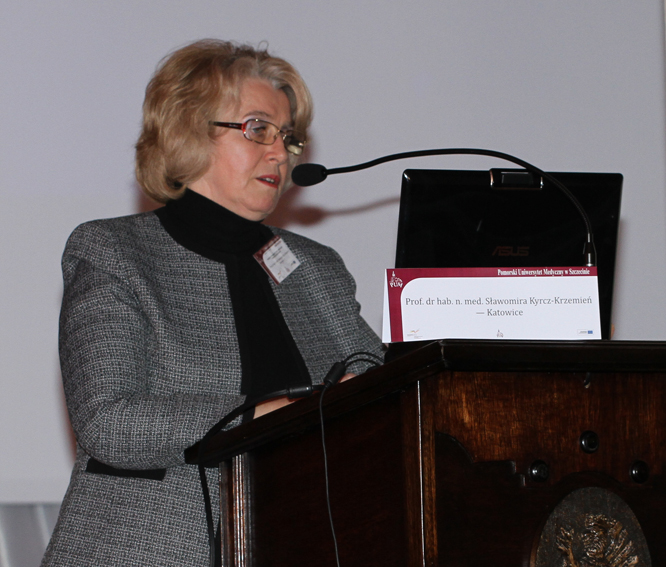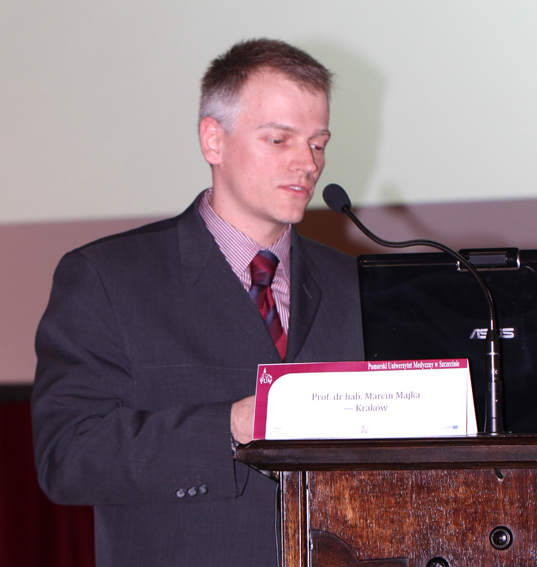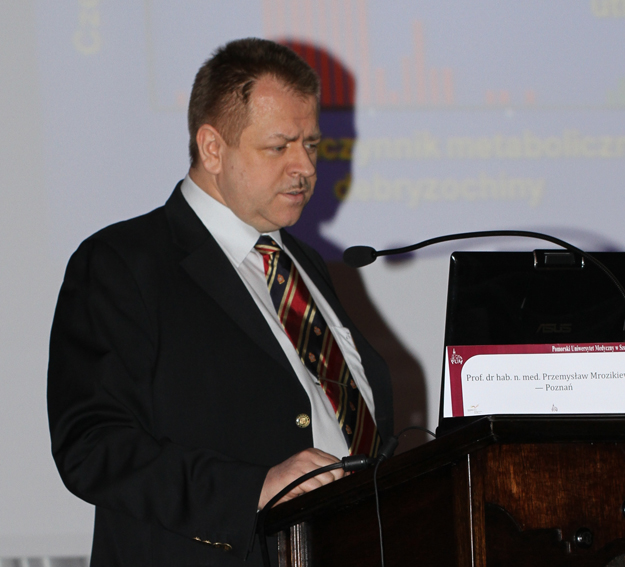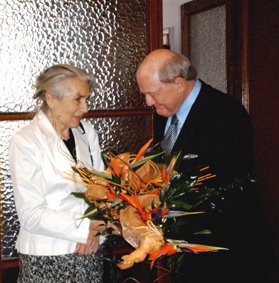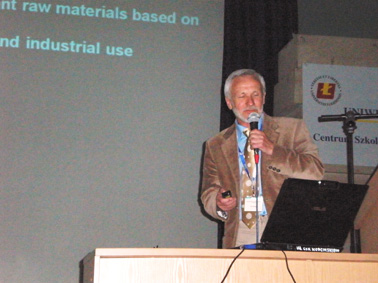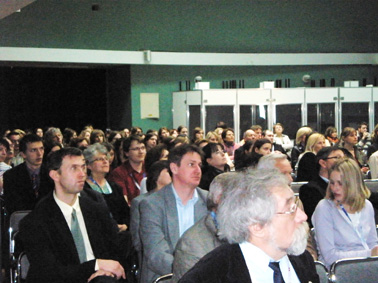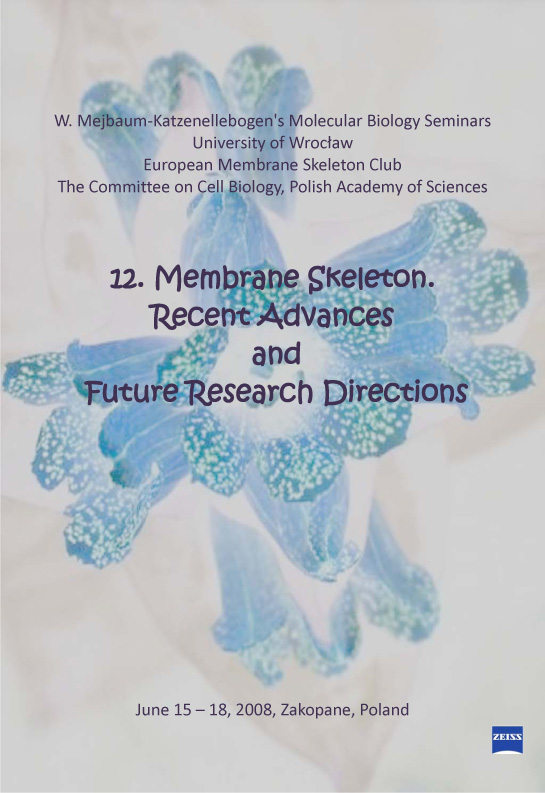On July 6 2015 at the Institute of Plant Protection-National Research Institute in Poznan the next workshop was held, which was co-organized by the Committee on Cell Biology entitled:
Identification of plant viruses – proteomic and electron microscopy techniques
The participants of the workshop were students of the University of Life Sciences and the Adam Mickiewicz University in Poznan. During the training theoretical lectures and practical classes were performed in the laboratory and the greenhouse complex of Department of Virology and Bacteriology and Plant Disease Clinic. The participants learned about Western blot technique used to identify viruses in plant material. They have also opportunity to carry out the isolation of RNA from the infected plants and perform loop-mediated isothermal amplification of nucleic acids. Moreover, students analyzed the samples of the plants using high performance electron microscopes in Research Center of Quarantine, Invasive and Genetically Modified Organisms.
The main organizer of the workshop was Dr Sci. Beata Hasiów-Jaroszewska - Member of: the Committee on Cell Biology and Committee of Plant Protection and the Young Academy of the Polish Academy of Sciences.
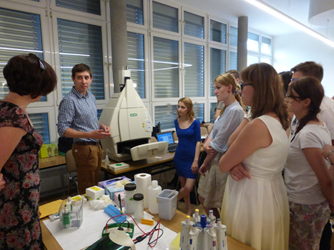 |
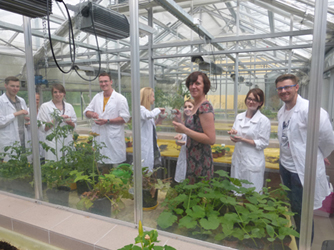 |
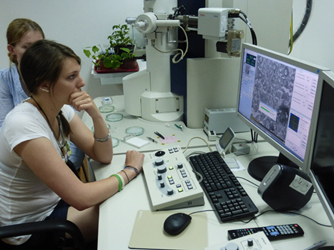 |
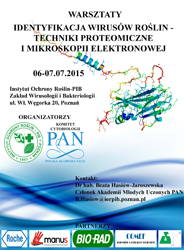 |
| Training in Western blot technique using BioRad equipment | Biological test in greehouse | Observation of plant virus particles in electron miscoscope |
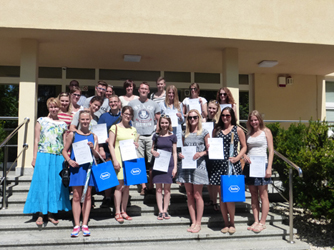 |
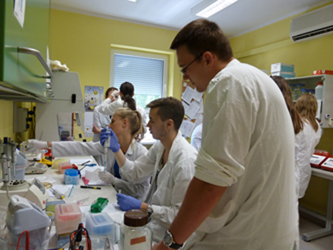 |
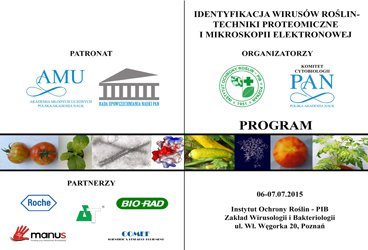 |
|
| Group photo | Isolation of RNA from infected plants |
During the conference the latest reports on modern methods used in cell therapy, transplantation and hematology were presented by distinguished Polish and foreign experts. In addition, to complement the lecture part, workshops on flow cytometry as a tool for cell identification and sorting of selected cell populations were held.
1. Gene therapy – including gene silencing technique in T-cell cancer treatment based on immune cells "reprogramming" and strategies for the identification of genes associated with incidence of leukemia
2. Stem cells (SCs) used for:
• a one-time infusion of SCs EPC from the bone marrow of the patient diagnosed with liver cirrhosis (autologous transplant) administered via the hepatic artery in case of hemato-oncologic disorders
• autologous transplantation of hematopoietic SCs in aggressive form of multiple sclerosis – in group of patients resistant to current treatment
• cord blood SCs in adjuvant treatment of severe neurodegenerative diseases.
Both in the opinion of participants and lecturers, the conference was very successful in terms of presented content and organization, that resulted in intense discussions. As a part of activities aimed at propagation of science among youth, the conference was also attended by approximately 40 high school students from the two best high schools in Szczecin.
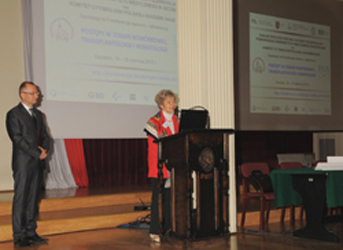 |
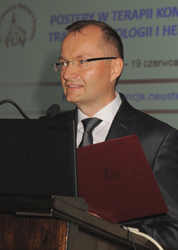 |
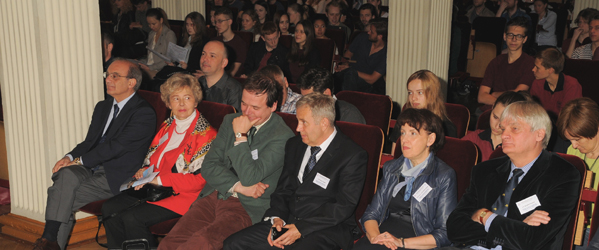 |
| Opening of the Conference - Professors: B. Machaliński i E. Wyroba |
Prof. dr hab. B. Machaliński | The Speakers: Professors (from the left): J. M. Prieto (Spain), E. Wyroba (Warsaw), C. A. Schmidt (Germany), G. Przybylski (Poznań), B. Zdziarska (Szczecin), M. Komarnicki (Poznań) |
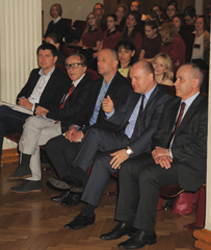 |
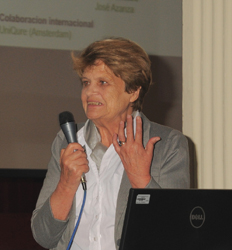 |
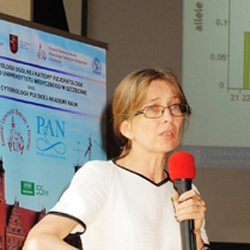 |
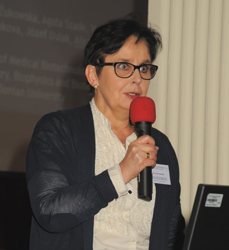 |
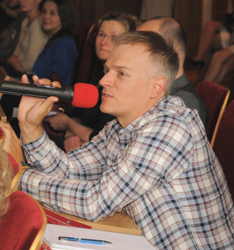 |
| The Speakers and Invited Guests (from the left): Dr M. Śmiłowski, Dr L. Szczechowski (Katowice), Prof. G. Helbig (Katowice), President of Szczecin Mr. P. Krzystek oraz Rector of PUM Prof. A. Ciechanowicz |
Prof. K. Domańska-Janik (Warszawa) - conducts the discussion | Prof. A. Józkowicz (Kraków) - Speaker; member of the Committee Cell Biology | Prof. L. Bużańska (Warszawa) - conducts the discussion | Discussion after the lecture - Prof. M. Majka |
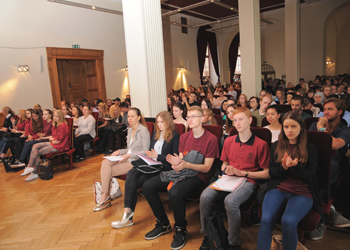 |
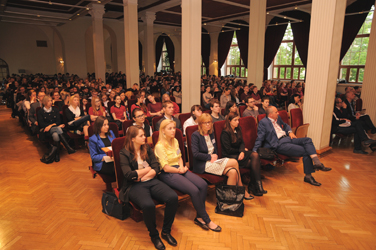 |
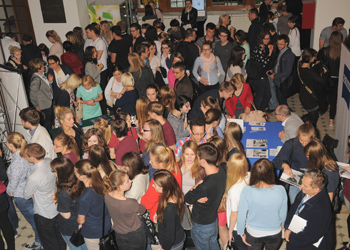 |
| Conference Hall | Exhibitors and participants of conference | |
Foto: J. Samborski
E. Wyroba and E. Pius
On 29-30 September 2014 at the Institute of Plant Protection-National Research Institute in Poznan the next workshop was held, which was co-organized by the Committee on Cell Biology:
Molecular and microscopic techniques
in the diagnostics of plant viruses
Together we have created a formula of the workshop spanning biological and agricultural sciences for the diagnosis of RNA viruses attacking, among others, crops to train specialists and minimize losses in the quantity and quality of the harvest.
The main organizer of the workshop was Dr Sci. Beata Hasiów-Jaroszewska - Member of: the Committee on Cell Biology and Committee of Plant Protection and the Young Academy of the Polish Academy of Sciences.
The workshop was attended by students of the University of Life Sciences and the Adam Mickiewicz University in Poznan.
During the workshop theoretical lectures and practical classes were organized in the laboratory and the greenhouse complex in Plant Disease Clinic. The participants have the opportunity to independently carry out the isolation of RNA from plants, isothermal reaction of DNA amplification and the bioassay test in the greenhouse. They also had a chance to get acquainted with new electron microscopes in Research Center of Quarantine, Invasive and Genetically Modified Organisms.
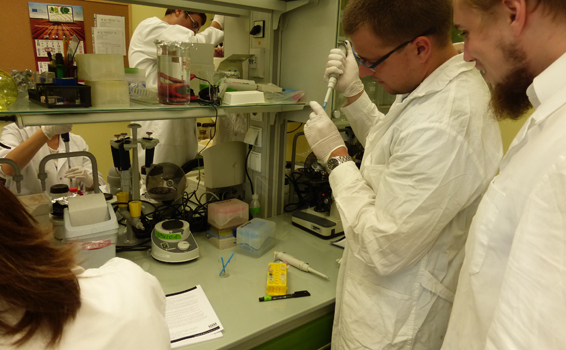 |
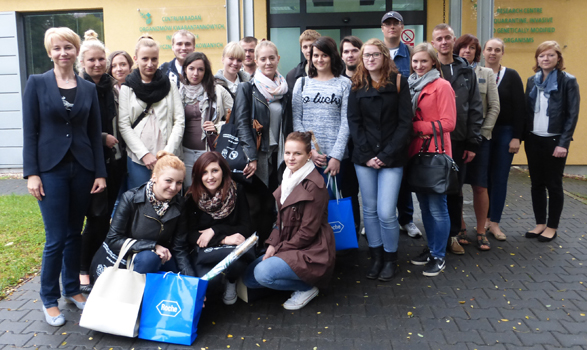 |
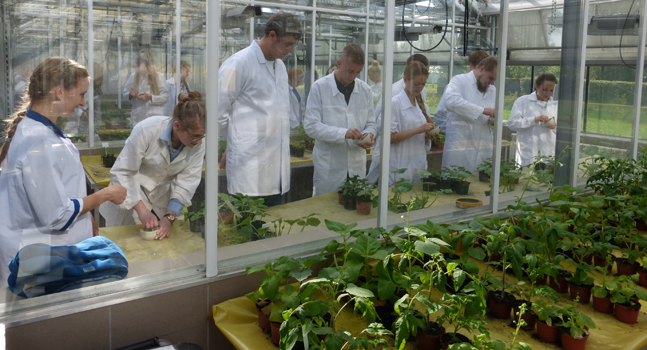 |
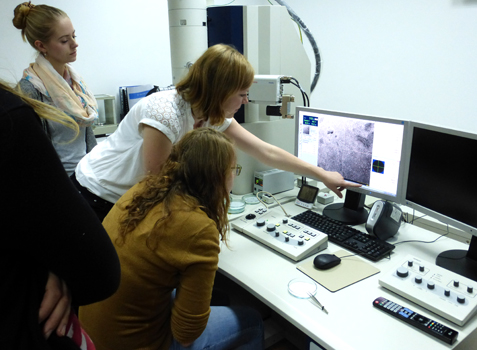 |
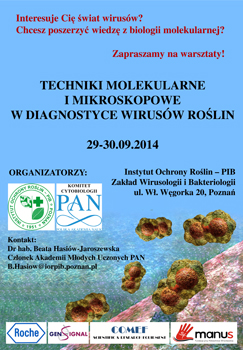 |
Plant Molecular Cytogenetics in Genomic and Postgenomic Era
This conference was organized on 23-24 September 2014 in Katowice by the Department of Plant Anatomy and Cytology, Faculty of Biology and Environmental Protection, University of Silesia in cooperation with the Committee on Cell Biology of the Polish Academy of Sciences.
The following persons participated in Conference Opening Ceremony: Dr Sci. Mirosław Nakonieczny - Vice-Rector of the University of Silesia, Professor Iwona Szarejko - Dean of the Faculty of Biology and Environmental Protection, Professor Robert Hasterok - Head of the Department of Plant Anatomy and Cytology, Professor Jolanta Małuszyńska - former Head of that Department (1992-2010)and Professor Elżbieta Wyroba - Chairperson of the Committee on Cell Biology.
The conference was attended by 160 persons (including many young scientists) representing 47 institutions from 15 countries (Austria, Belgium, Brazil, Czech Republic, Germany, Hungary, Iceland, Italy, Netherlands, Poland, Russia, Spain, Turkey, United Kingdom, Uruguay). During the conference 16 lectures and 78 posters were presented.
The lectures were given by eminent scientists (h-index reaching 41) coming from 7 countries, conducting research on issues related to the theme of the conference:
Dieter Schweizer (University of Vienna, Austria)
Endosperm cytology: a neglected field in epigenetics research
J.S. Pat Heslop-Harrison (University of Leicester, UK)
Chromosomes, crops and superdomestication
Hans de Jong (Wageningen University and Research Centre, the Netherlands)
Plant Genetics in the Era of Modern Genomics
Ingo Schubert (Leibnitz Institute of Plant Genetics and Crop Plant Research, Gatersleben, Germany)
Double-strand break repair – linking the molecular with the microscopic level
Andreas Houben (Leibnitz Institute of Plant Genetics and Crop Plant Research, Gatersleben, Germany)
Centromere biology meets plant breeding
Paul Fransz (University of Amsterdam, the Netherlands)
Genetic and phylogenetic consequences of a unique paracentric inversion in Arabidopsis
Hanna Weiss-Schneeweiss (University of Vienna, Austria)
More than meets the eye: numerical convergence, multiple cycles of hybridization, and contrasting evolutionary trajectories in polyploids of the Prospero autumnale complex
Elwira Sliwinska (University of Technology and Life Sciences, Bydgoszcz, Poland)
Exploring plant genome by flow cytometry
Glyn Jenkins (Aberystwyth University, UK)
‘Optimising’ the germplasm of barley by manipulating recombination
Martin Lysak (Masaryk University, Czech Republic)
More than the cabbage: chromosome and genome evolution in crucifers
Kesara Anamthawat-Jonsson (University of Iceland, Reykjavík)
Hybridization, introgression and phylogeography of Icelandic birch
Barbara Naganowska (Institute of Plant Genetics, Polish Academy of Sciences, Poznan, Poland)
Cytomolecular analyses in the genus Lupinus
Wojciech Plader (Warsaw University of Life Sciences, Poland)
Cucumber genomes and chromosome polymorphism within the genus Cucumis
Robert Hasterok (University of Silesia in Katowice, Poland)
Brachypodium - a model genus to study grass genome organisation at the cytomolecular level
Neil Jones (Aberystwyth University, UK)
B chromosomes in plants: quo vadis
Elzbieta Kuta (Jagiellonian University, Cracow, Poland)
Holocentric chromosomes in monocotyledonous genus LuzulaD.C. (Juncaceae) – from chromosome number to molecular structure
Trude Schwarzacher (University of Leicester, UK)
Repetitive DNA in plant genomes
All the presentations were followed by vivid discussion that was continued at the poster session.
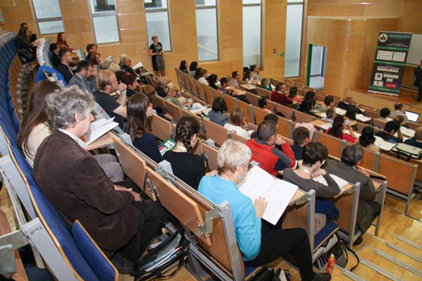 |
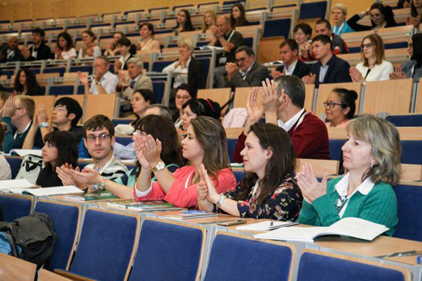 |
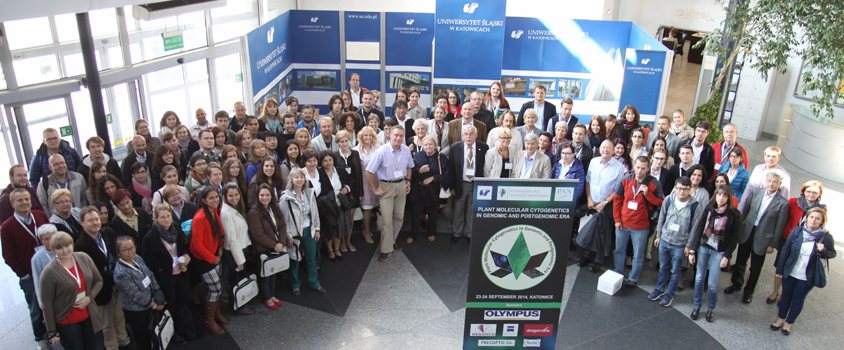 |
|
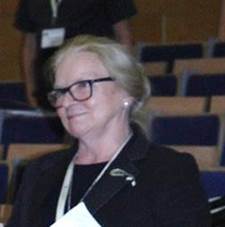 Lecturers emphasized the merits of Prof. J. Małuszyńska, the author of publications in prestigious scientific journals and textbooks, who introduced and developed in Poland the modern study of the structure and function of the plant genome. Promoting international cooperation and staff training, she organized the courses in molecular cytogenetics and application of plant tests in the assessment of genotoxicity of environmental factors. She supervised 12 PhD and >100 MSc theses at the University of Silesia. Many researchers from different centers in Poland and from abroad took their internships at this University under Prof. J. Małuszyńska’s guidance.
Lecturers emphasized the merits of Prof. J. Małuszyńska, the author of publications in prestigious scientific journals and textbooks, who introduced and developed in Poland the modern study of the structure and function of the plant genome. Promoting international cooperation and staff training, she organized the courses in molecular cytogenetics and application of plant tests in the assessment of genotoxicity of environmental factors. She supervised 12 PhD and >100 MSc theses at the University of Silesia. Many researchers from different centers in Poland and from abroad took their internships at this University under Prof. J. Małuszyńska’s guidance.
In the opinion of the participants conference was a very successful discussion on the achievements of the molecular cytogenetics of plants and future research prospects in the era of ongoing sequencing of plant genomes.
Additional information about the conference and the book of abstracts: www.pmc.us.edu.pl. Photographs from: http://www.us.edu.pl.
MINI-SYMPOSIUM
NEW ASPECTS OF SIGNALING PATHWAYS FROM CILIA TO NUCLEUS
This symposium was organized by our Committee and Department of Cell Biology, Nencki Institute of Experimental Biology on September 22, 2014.
In the introduction Prof. E. Wyroba pointed out the long-lasting cooperation with the two distinguished guests:
Professor Peter Satir and Professor Birgit H. Satir from Albert Einstein College of Medicine in New York.
They attended conferences and symposia in Poland starting from 1968 till 2006 organized by Nencki Institute and/or our Committee.
Professor Peter Satir gave the lecture:
‘UNEXPECTED RELATIONSHIPS BETWEEN CILIA AND HUMAN HEALTH’
After the lecture Prof. L. Kuźnicki (former President of PAS and co-founder of the Committee) and Prof. W. Korohoda (Honorary Chairman of the Committee)
with Prof. E. Wyroba (Chairman of the Committee) congratulated Prof. P. Satir on the occasion of the winning the E.B. Wilson Medal ‘Giants of the Cytoskeleton’ 2014
and presented this letter to Him.
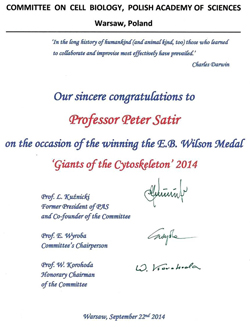 |
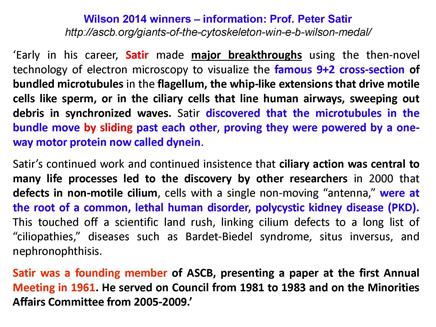 |
Next, the scientific and editorial achievements of Prof. Birgit H. Satir were outlined on the slides by prof. E. Wyroba.
The lecture of Professor Birgit H. Satir was entitled:
‘IMPLICATIONS OF CILIARY AND NUCLEAR LOCALIZATION OF A SIGNALING SCAFFOLD PROTEIN: PARAFUSIN'
After the lectures a vivid discussion took place followed by individual meeting of one of the scientists with Prof. P. Satir.
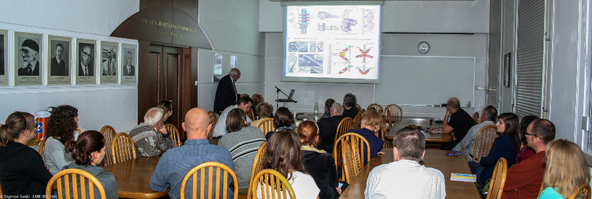 |
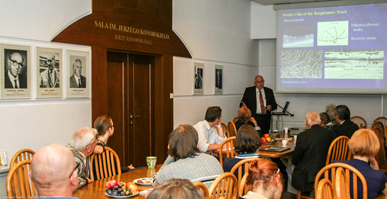 |
| Lecture of Prof. P. Satir |
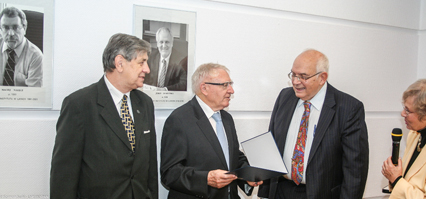 |
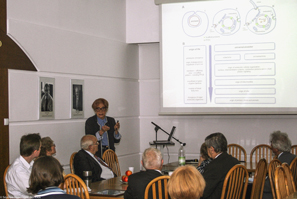 |
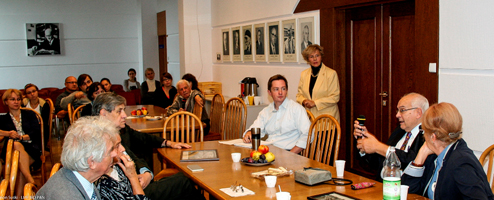 |
| Professors W. Korohoda, L. Kuźnicki and E. Wyroba-Congratulation letter to Prof. P. Satir | Lecture of Prof. B. H. Satir | Discussion |
Photo: S. Suski
International conference
”Mammalian Embryology Conference Celebrating Pioneering Work of Professor Andrzej K. Tarkowski”
was held in Warsaw on October 25-26, 2013. It was organized to celebrate the 80th birthday of Professor Andrzej K. Tarkowski, one of the pioneers of developmental biology of mammals. The conference was organized by the Faculty of Biology University of Warsaw, Committee on Cell Biology of the Polish Academy of Sciences, University of Warsaw Foundation, and Foundation for Polish Science.
The conference program consisted of three sessions, which presented different aspects of mammalian development: regulation of the cell cycle during gametogenesis, activation of the fertilized oocyte, regulation of embryonic mitotic divisions, mechanisms responsible for cell lineage specification and differentiation, totipotency, pluripotency, cloning of mammals, evolutionary aspects of the early mammalian embryo, and developmental epigenetics.
The invited speakers – the most renowned specialists in the field of developmental biology of mammals - presented their novel discoveries and demonstrated fundamental importance of pioneering studies of Professor Tarkowski for the progress of modern mammalian embryology, animal breeding, and assisted reproduction. Following lectures were presented:
-
Prof. Chris Graham (University of Oxford, Wielka Brytania) Introductory Lecture: 0-80 in 25 mins
-
Prof. Jacek Modliński (Instytut Genetyki i Hodowli Zwierząt PAN, Polska) Studies on embryonic diapause and embryo biopsy: implications for human medicine
-
Dr Jacek Kubiak (Cell Cycle Team, Francja) Cell cycle regulation in oocytes and embryos: from cell fusion to cell-free extracts
-
Prof. Magdalena Żernicka-Goetz (University of Cambridge, Wielka Brytania) How do cells gain and lose ability to make many possible cell types and how is the body plan laid down?
-
Dr Aneta Suwińska (Uniwersytet Warszawski) Potencies of cells in preimplantation mouse embryo
-
Dr Zbigniew Polański (Uniwersytet Jagielloński) Spindle assembly checkpoint in mammalian oocytes
-
Prof. Josef Fulka (Institute of Animal Science, Czechy) The enucleolation of mammalian oocytes and one-cell stage embryos
-
Prof. Jean-Pierre Ozil (UMR BDR INRA, Francja) Developmental consequences of egg functioning during fertilization in the mouse
-
Prof. Pascale Debey (Biologie du Developpement et Reproduction, Francja) From fixation to observation of live embryos: Dynamics of chromatin in early mouse embryos
-
Prof. Janet Rossant (University of Toronto, Kanada) Making a mouse blastocyst – from cells to genes and back again
-
Dr Berenika Płusa (University of Manchester, Wielka Brytania) Cell plasticity and lineage segregation during mammalian development
-
Prof. Davor Solter (Institute of Medical Biology, Singapur) Developmental epigenetics
-
Prof. Małgorzata Kloc (University of Texas, USA) Unexpected structural functions of mRNAs
-
Prof. Juan Aréchaga (University of Basque Country, Hiszpania) Primordial germ cells migration versus embryonal carcinoma invasion
-
Prof. Lynne Selwood (University of Melbourne, Australia) Evolutionary aspects of the early mammalian embryo
-
Andrzej K. Tarkowski (Department of Embryology, University of Warsaw, Poland) Returning to the beginnings:old dish with a new sauce
The conference was attended by 176 participants, including 26 scientists from all over the world. Some of them presented the results of their studies during poster session. The meeting created great opportunity for discussions and networking between leading researchers of mammalian development, students, and academics interested in conference topic. Abstracts of the presented lectures and posters were included in the conference book. Summaries of the lectures will be published as a Conference Report in a special volume of International Journal of Developmental Biology in 2014.
Meeting Report from this conference was published in Int. J. Dev. Biol. 57:799-808 (2013) and pdf is here
Diagnostics of RNA viruses - molecular biology and electron microscope techniques
This workshop was organized on October 24-25, 2013 in the Institute of Plant Protection-National Research Institute in Poznan. The co-organizer of the workshop was Committee on Cell Biology of the Polish Academy of Sciences.
Students and PhD students from the University of Life Sciences and the Adam Mickiewicz University in Poznan had the opportunity to carry out the experiments (eg. real-time PCR, bioassay, preparation of samples for observation in electron microscope). They also visited the Research Center of Quarantine, Invasive and Genetically Modified Organisms.
The subject of the workshop is extremely important: viral diseases are often cause of yield and quality losses of important crops. The number of specialists working in this field is limited that is why we – as the first - have taken the initiative to train the young researchers.
The significant effect of this kind of events is the interest of students to perform BSc and MSc thesis in the Institute of Plant Protection - National Research Institute.
The main organizer of the workshop was Dr Beata Hasiów-Jaroszewska - member of Committee on Cell Biology, Committee of Plant Protection and the Young Academy of the Polish Academy of Sciences.
Conference: "Cell Biology in the last half-century" was organized in Warsaw on December 1, 2012 on 40th Anniversary of Committee on Cell Biology in which 151 persons participated.
The conference was opened by Professor Elżbieta Wyroba, Chairman of the Committee who welcomed all participants, and honored guests: Professor A. Szewczyk – Director of Nencki Institute and co-founders of the Committee: Professor Lech Wojtczak and Professor Leszek Kuźnicki – Full PAS Members. E. Wyroba presented the Committee activities and its leading senior members. She thanked them for many years of fruitful cooperation and the audience rewarded them with applause.
Next she introduced speakers: biologists of different specializations and physicians, including Polish scientists educated in Poland but working in the UK and the U.S.
The conference program consisted of theoretical and clinical aspects of the most important biological discoveries of the twentieth century. The topics included the most important genetic, immunological and metabolic discoveries, related to innovative targeted therapies enabling the treatment selection after sequencing of the patient's genome. The lectures provoked fruitful discussions, which were continued in the lobby.
The conference had a unique atmosphere resulting from both the scientific and inter-generational connections since the senior Commitee’s members met their former Students.
Conference demonstrated that mission of this Committee to break the barriers between biology and medicine is extremely fruitful both intellectually and scientifically. Committee on Cell Biology from the beginning of its founding is the only forum in Poland, where physicians - including outstanding clinicians harmoniously cooperate with biologists.
The conference overcame other barriers: cells and tissues types as well as different in the biological sciences field presenting the achievements of biochemistry, genetics, and organelles evolution theory. This is remarkably important for broadening the horizons of many young scientists attending the conference.
The conference in the opinion of both the participants and the lecturers has been recognized as very well-prepared. It enabled exchange off information between scientists from different research centers, as well as the verification of different diagnostic, therapeutic and research applications used in various laboratories.
The conference
on
"ADVANCES
IN HAEMATOLOGY, ONCOLOGY
AND
CELL THERAPY"
was held in Szczecin (April 14-15, 2011) and was organized
by Department of General Pathology,
Chair of Physiopathology, Pomeranian University of Medicine, Szczecin,
Department of Molecular Hematology, Ernst-Moritz-Arndt-Universität,
Greifswald (Germany) and Committee on Cell Biology, The Polish Academy of
Sciences.
There were 380 participants including: 4 lecturers from
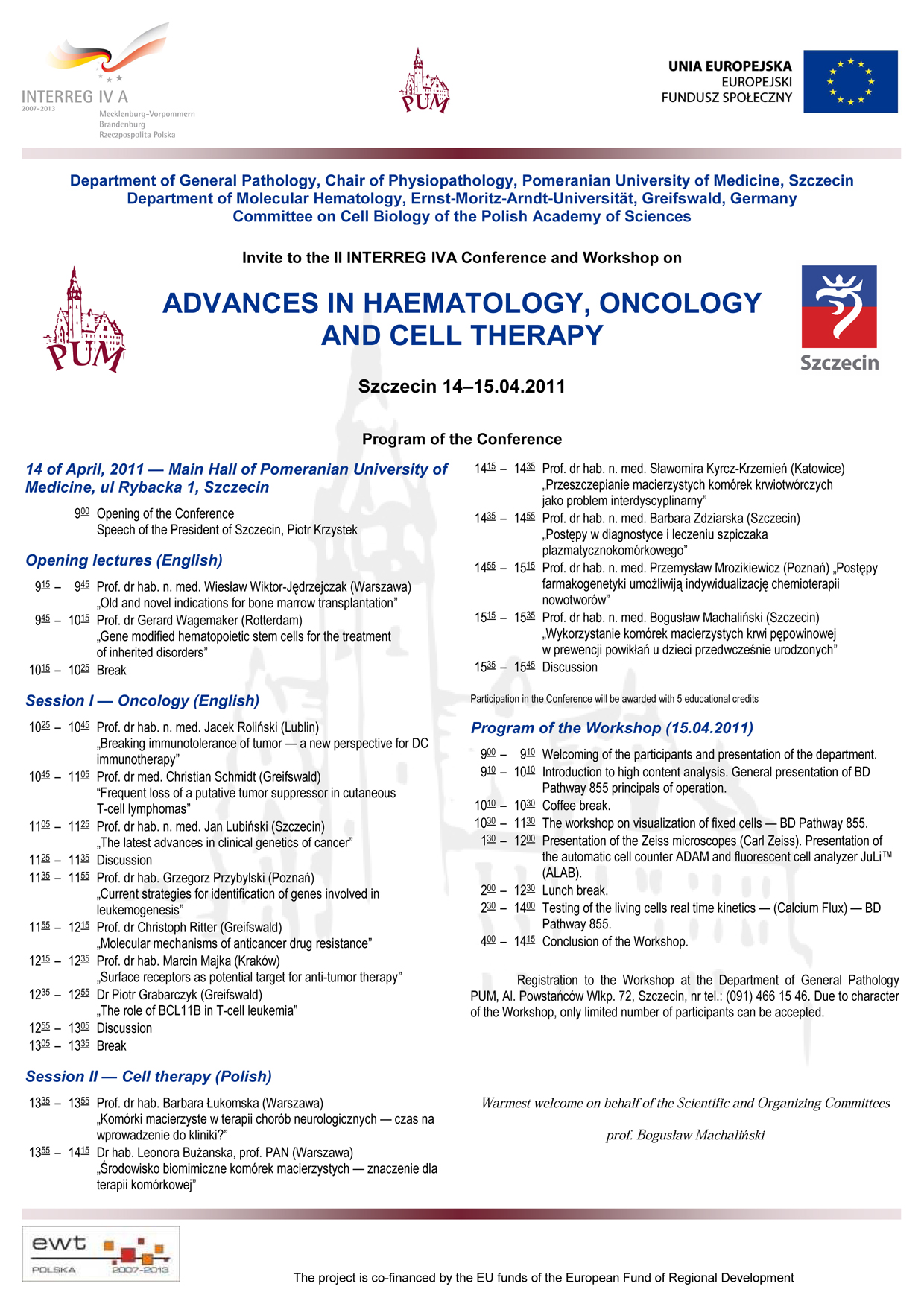
|
|
|
|
|
Photo 1: Prof. W.W. Jędrzejczak
Photo 2: Conference Hall: in the first row: prof. B. Łukomska, dr hab. L. Bużańska,
in the second row: prof. B. Zdziarska
Photo 3: Conference Hall: in the first row: prof. W. Lubiński, in the second
row: prof. B. Machaliński - the Organizer of the Conference
Photo 4: Workshop
Photos
|
|
|
|
|
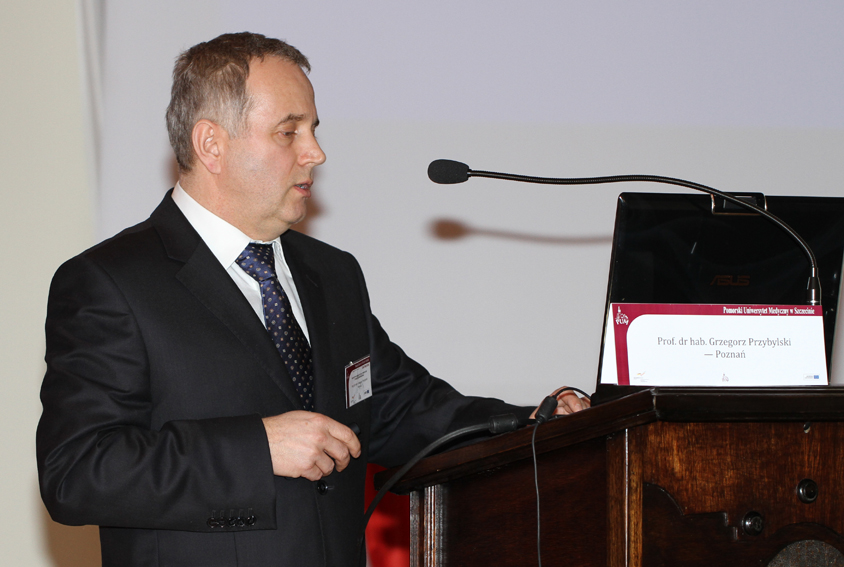 |
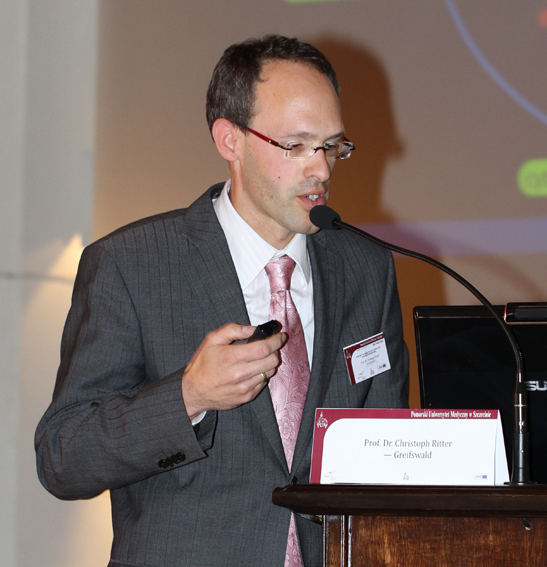 |
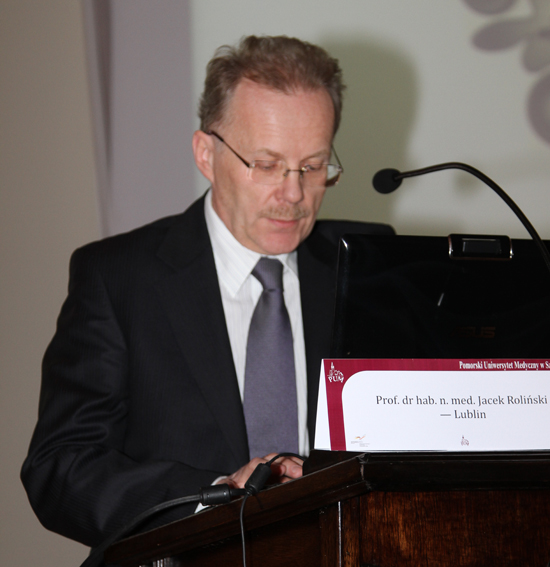 |
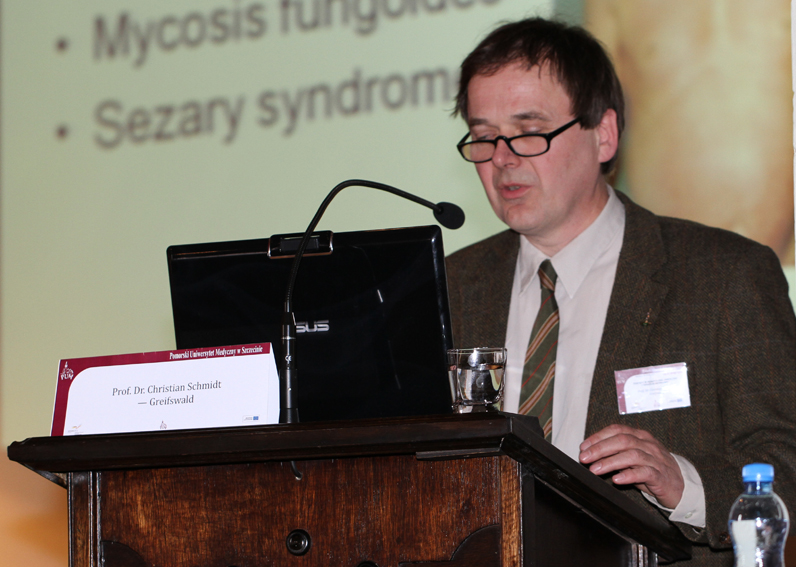 |
Photo 1: Prof. G. Przybylski
Photo 2: Prof. Ch. Ritter
Photo 3: Prof. J. Roliński
Photo
4: Prof. Ch. A. Schmidt
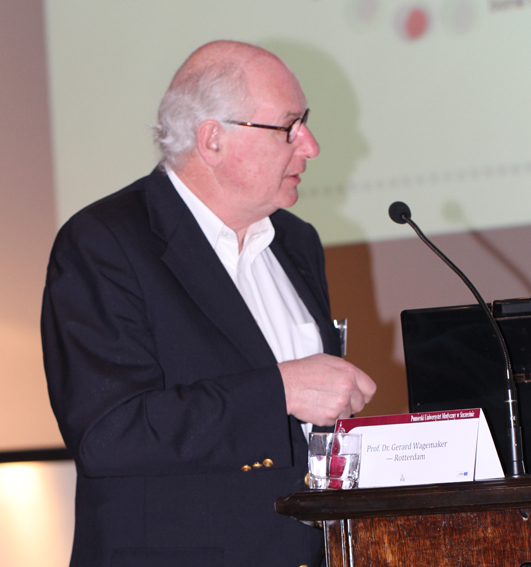 |
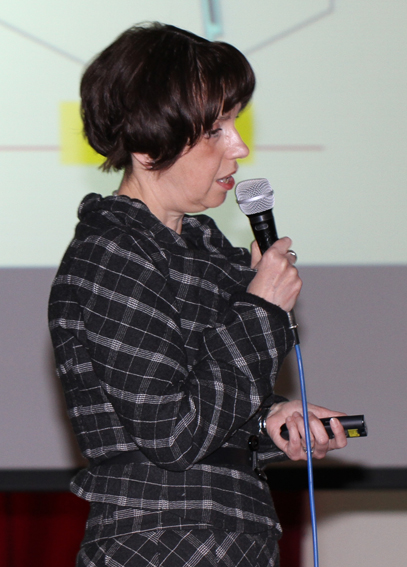 |
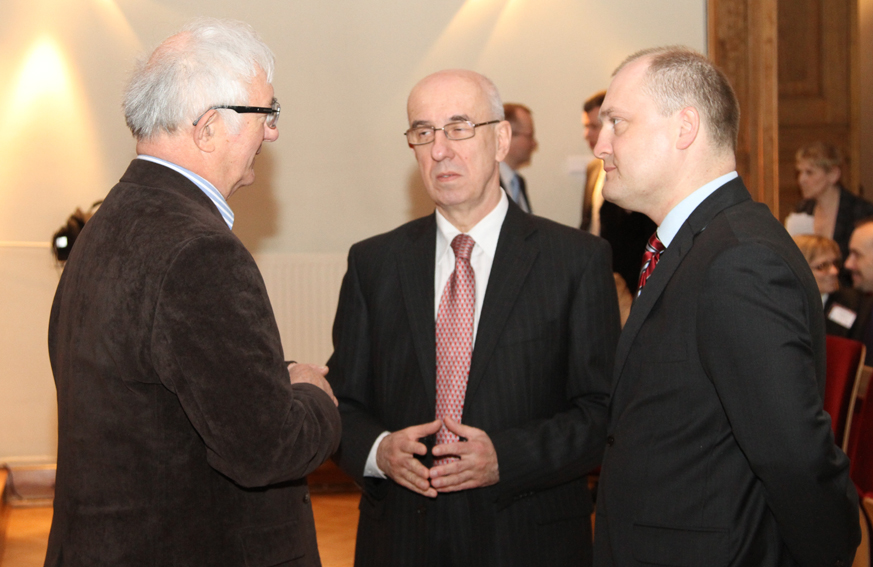 |
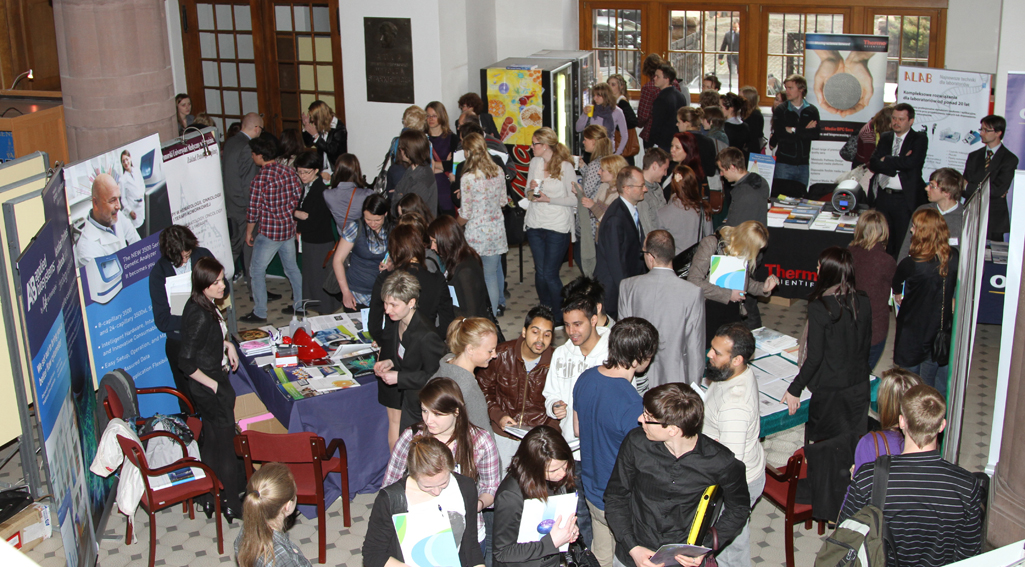 |
Photo 1: Prof. G. Wagemaker
Photo 2: Prof. B. Zdziarska
Photo 3:
Chancellor of PUM: J. Łuczak, Rector of PUM: Prof. P. Nowacki, President of
Szczecin: P. Krzystek
Photo
4: Exhibitors and participants of conference
A TRIBUTE TO PROFESOR MARIA JOANNA OLSZEWSKA
With a great sorrow we inform that Profesor Maria Joanna Olszewska passed away on February 3, 2010 in Lodz (Poland)
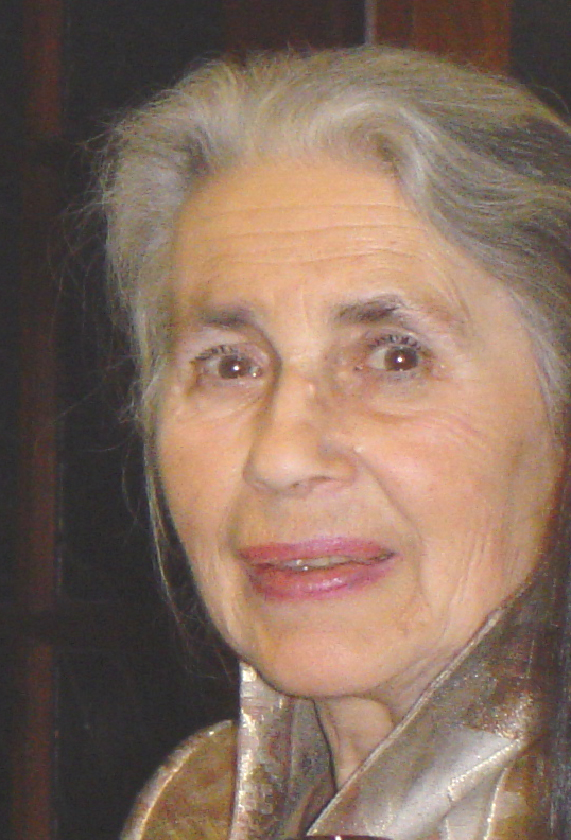 Maria
Joanna Olszewska, cell biology, molecular
cytogenetics, Born Apr. 21, 1929, Dąbrówka Polska, Poland. Education: High
Sch. of Agriculture - Eng. (1949); University of Łódź – M.Sc. (1950), PhD
(1956), Dr. Sci. (1960). Rockefeller Foundation fellowship for post-doctoral
studies in prof. Brachet’s Laboratory (1959-1960, Brussels, Belgium).
Associate professor (1969), full professor (1978). University of Łódź:
assistant, senior assistant, docent (1950-1971); head of the Laboratory of
Cytochemistry (1961-1971), head of the Department of Plant Cytology and
Cytochemistry (1971-1999). Since 1999 retired, affiliated with the Dept. of
General Genetics, Plant Molecular Biology and Biotechnology, University of
Łódź, Research concerns the role of cell nucleus, synthesis of nuclear DNA
and RNA, cell cycle in plants and molecular cytogenetics.
Maria
Joanna Olszewska, cell biology, molecular
cytogenetics, Born Apr. 21, 1929, Dąbrówka Polska, Poland. Education: High
Sch. of Agriculture - Eng. (1949); University of Łódź – M.Sc. (1950), PhD
(1956), Dr. Sci. (1960). Rockefeller Foundation fellowship for post-doctoral
studies in prof. Brachet’s Laboratory (1959-1960, Brussels, Belgium).
Associate professor (1969), full professor (1978). University of Łódź:
assistant, senior assistant, docent (1950-1971); head of the Laboratory of
Cytochemistry (1961-1971), head of the Department of Plant Cytology and
Cytochemistry (1971-1999). Since 1999 retired, affiliated with the Dept. of
General Genetics, Plant Molecular Biology and Biotechnology, University of
Łódź, Research concerns the role of cell nucleus, synthesis of nuclear DNA
and RNA, cell cycle in plants and molecular cytogenetics.
Corresponding member of the Polish Academy of Sciences (1989), full member
(2005). President of the Łódź Branch of the Polish Academy of Sciences
(1993-1998), member of the Praesidium of the Polish Academy of Sciences
(1993-2006), member of Committee on Cell Biology.
Author and co-author, editor and co-editor of five handbooks (in Polish). Co-editor of a journal “Advances in Cell Biology” (in Polish - Postępy Biologii Komórki, articles concerning genetics and plant cell biology). Honours: Polonia Resituta Crosses III, II and I Class; Honorary member of the Soc. Sci. Lodzensis, Polish Botanical Soc., Polish Histo- and Cytochemical Soc., Polish Soc. of Cell Biology.
Selected publications:
Olszewska M.J., Brachet J. 1960. Influence of localized ultra-violet irradiation on the incorporation of adenine-8-14C and D,L-methionine35S in Acetabularia mediterranea. Nature 187: 954-955.
Olszewska M.J., Wroński M., Fortak W. 1967.
A histochemical method for revealing disulphide bonds by means of hydrogen
selenide. Folia Histochem. Cytochem. 5: 7-14.
Olszewska M.J., Godlewski M. 1972.
Autoradiographic study of the synthesis of nucleic acids and protein during
the cell cycle of synchronously dividing antheridial filaments in Chara
vulgaris L. Folia Histochem Cytochem. 10: 245-256.
Olszewska M.J. 1978. Chromatin condensation
in late G2 phase as a factor related to the earlier initiation of mitosis in
successive generations of antheridial filaments of Chara vulgaris.
Microsc. Acta 80: 115-126.
Olszewska M.J., Damsz B., Rabęda E., 1983.
DNA endoreplication and increase in number of chloroplasts during leaf
differentiation in five monocotyledonous species with different 2C DNA
content. Protoplasma 116: 41-50.
Olszewska M.J., Osiecka R. 1983. The
relationship between 2C DNA content, life cycle type, systematic position
and the dynamics of DNA replication in parenchyma nuclei during growth and
differentiation of roots in some dicotyledonous herbaceaous species.
Biochem. Physiol. Pflanzen 178: 581-599.
Olszewska M.J., Damsz B., Kuran H., Marciniak
K. 1984. Enhanced rRNA transport from nucleoli into cytoplasm at G1/S,
S/G2 and G2/M transitory points of the cell cycle in root meristem of
Helianthus annuus L. Eur. J. Cell Biol. 33: 1-6.
Olszewska M.J., Kononowicz A.K., Maszewski J., Mądrzak C., Konieczny A.,
Legocki A.B. 1989. Changes in DNA content during
rhizobial nodule development in Lupinus luteus L. II. In situ hybridization
of cDNA coding for leghemoglobin. Biol. Zent.
Bl. 108: 231-239.
Olszewska M.J., Marciniak K., Kuran H. 1990. The
timing of synthesis of proteins required for mitotic spindle and
phragmoplast in partially synchronized root meristems of Vicia faba
L. Eur. J. Cell Biol. 53: 89-92.
Olszewska M.J., Karłowski W., Legocki A.B. 1994.
In situ hybridization of two nodule-specific gene products from yellow lupin.
Folia Histochem. Cytobiol. 32: 205-208.
Olszewska M.J., Gernand D., Godlewski M., Kunachowicz A. 1997.
DNA methylation during antheridial filament development
and spermiogenesis in Chara vulgaris L. (Charophyceae) analyzed by in situ
nick-translation. Eur. J. Phycol. 32:
287-291.
Sakowicz T., Olszewska M.J. 1997. DNA content, interphase AgNOR-area, number of 3HrDNA hybridization signals and the methylation level in coding rDNA sequence in different organs of Lupinus luteus L. Genetica 99: 67-72.
Łuchniak P., Małuszynska J., Olszewska M.J. 2000. Different DNA methylation pattern in A and B chromosome of Crepis capillaris detected by in situ nick-translation. Comparison with molecular methods. Folia Histochem. Cytobiol. 40: 325-330.
The conference “FROM PLASMA MEMBRANE TO THE NUCLEUS - SIGNALING PATHWAYS INDISPENSABLE FOR LIFE” was organized in Warsaw at the Nencki Institute of Experimental Biology on October 16, 2010 by the Committee on Cell Biology of the Polish Academy of Sciences in cooperation with the Department of Molecular Genetics, University of Łódź and Nencki Institute.
The conference was devoted to discussing the latest research results concerning the transmission of signals in the cell as the basic process of sustained physiological balance necessary for proper differentiation, growth and cell survival. Signaling pathways not only affect the metabolism, but also generate cell response to changes in the extracellular environment including, for example DNA damage. Signal processes are strictly controlled, and their dysfunction may disrupt cellular mechanisms, such as proliferation, apoptosis, adhesion, and consequently lead to the development of many diseases, including cancer. The initiator and organizer of the conference was Prof. Elżbieta Wyroba. The conference consisted of nine multimedia presentations. The speakers were eminent specialists, conducting research on issues related to the theme of the conference of multiple aspects: molecular, physiological and immunological in both normal and cancer cells:
Prof. Marta Miączyńska (International Institute of Molecular and Cellular Biology, Warsaw)
Endocytosis and intracellular signaling
Prof. Marzena Podhorska-Okołów (Department of Histology and Embryology, Medical University of Wrocław)
The membrane signaling pathways leading to apoptosis
Prof. Janusz Błasiak (Department of Molecular Genetics, University of Łódź)
Signaling pathways in the cell response to DNA damage
Dr Katarzyna Piwocka (Nencki Institute of Experimental Biology, PAS, Warsaw)
Endoplasmic reticulum stress response as a novel mechanism regulating cell death and survival.
Prof. Czesław Cierniewski (Institute of Medical Biology, PAS, Łódź)
Role of integrin receptors in resistance to anoikis in tumor cells
Prof. Bożena Kamińska (Nencki Institute of Experimental Biology, PAS, Warsaw)
JAK/STAT signaling: involvement in the regulation of immunological mechanisms and dysfunction in cancer
Prof. Małgorzata Czyż (Department of Molecular Biology of Cancer, Medical University of Łódź)
Anti-cancer targeted therapy: successes and bottlenecks
Dr Michał Grzybek (Max-Planck Institute of Molecular Cell Biology and Genetics, Dresden, Germany)
Effect of lipids on the activity of epidermal growth factor receptor
Prof. Wojciech Młynarski (Department of Pediatrics, Oncology, Hematology and Diabetology, Medical University of Łódź; Joslin Diabetes Center and Department of Medicine, Harvard Medical School, Boston, USA)
Signaling pathways of insulin secretion and genetic defects leading to diabetes
The conference was attended by 104 persons, including 70 young investigators (Ph.D. and M. Sci. students) from all over the country. The lectures and discussion were live recorded. In opinion of the participants conference was very interesting and successful. It should be emphasized that the speakers provided novel and unpublished data, in which there were also observations from the clinical practice in the treatment of monogenic diabetes.
The Symposium „CALCIUM AND GENE EXPRESSION IN DIFFERENTATION” was held in Warsaw on the 8th of September 2010. It was organized by the International Institute of Molecular and Cellular Biology, the Nencki Institute of Experimental Biology and the European Calcium Society (ECS) with an important financial support of the Committee on Cell Biology of the Polish Academy of Sciences.
The Symposium, co-chaired by Dr Wiesława Leśniak (Warsaw, Poland) and Prof. Joachim Krebs (Gottingen, Germany), consisted of five multimedia presentations: 3 plenary lectures (40 min) and 2 oral presentations (20 min) followed by a long discussion and a poster session. The speakers and the titles of their presentations were as follows:
Prof. Catherine Leclerc (Toulouse, France): Calcium signaling and gene expression during early neurogenesis in Xenopous laevis
Prof. Jose Naranjo (Madrid, Spain): DREAM regulates synaptic plasticity in the hippocampus
Prof. Douglas L. Black (Los Angeles, USA): Mechanism and programs of neuronal alternative pre-mRNA splicing
Dr Ewa Kilańczyk (Warsaw, Poland): The influence of CacyBP/SIP and S100A6 on the level of pERK1/2 kinases and on cell differentiation
Dr John J. McKrill (Cork, Ireland): Ca2+-dependent repression of the matrix metalloprotease-2 gene
The Symposium speakers provided novel and revealing data obtained in their laboratories concerning the effect of calcium ions on transcription, alternative splicing etc., as well as on the higher-order processes such as neurogenesis, learning and memory. All the presentations were followed by animated discussion continued at the poster session.
The Symposium was attended by 238 participants and 20 guests from 19 European countries and from overseas. Most of them were students, PhD students and young researchers. Abstracts of the presented lectures and posters were published in a special volume of Acta Biologica Polonica (vol 57, suppl. 2/2010).
IV.
BIOGERONTOLOGICAL MEETINGS AT THE NENCKI INSTITUTE - FROM DEVELOPMENT TO THE
AGEING OF THE ORGANISM were organized in Warsaw on October 17, 2009
by the Committee on Cell Biology PAS in cooperation with Nencki Institute of
Experimental Biology, International Institute of Molecular and Cell Biology
(Warsaw) and Faculty of Biology (Warsaw University). 149 persons from all
over the country participated in the conference including 83 young
scientists for whom a very modest registration fee was waved.
These Meetings were established in 2006 by Prof. Ewa Sikora who invited this year the following speakers:
Session 1a: Cell cycle regulation in Development, Senescence and Cancer
09:00‐09:35
Piotr Siciński,
Department of Pathology, Dana Farber Cancer Institute, Boston
Cell cycle‐independent
functions of cyclins revealed by a "genetic-proteomic"
screen
09:35‐10:20
Jekaterina Erenprisa,
Latvia Biomedicine Research and Study Centre, Riga
Cancer (stem) cell life-cycle:
a hypothesis
10:20‐10:45
coffee and refreshments
Session 1b: Cell cycle regulation in Development, Senescence and Cancer
10:45‐11:20 Urszula Wojda, International Institute of Molecular and Cell Biology, Warsaw
Cell cycle regulation of human lymphocytes differentiate sporadic versus familial Alzheimer's disease
11:20‐11:55 Andrzej Składanowski, Gdansk University of Technology, Gdansk
Cancer stem cells, stemloids and escape from drug-induced premature senescence in human lung tumor cells
11:55‐12.30 Jacek Witkowski, Medical University, Gdańsk
Klotho in cellular and organismal ageing
12:30‐13:15 lunch
Session 2a: Genetics and Epigenetics of Development, Cancer and Ageing
13:15‐13:50 Ewa Bartnik, Warsaw University, Warsaw
Mitochondria in cancer and aging
13:50‐14:25 Jan Barciszewski, Institute of Bioorganic Chemistry PAS, Poznan
Analysis of global DNA methylation
14:25‐15:00 coffee
Session 2b: Genetics and Epigenetics of Development, Cancer and Ageing
15:00‐15:35 Monika Puzianowska-Kuźnicka, Medical Center of Experimental Biology, Warsaw
How diet modifies epigenome and influences ageing?
15:35‐16.10 Mariusz Więckowski, Nencki Institute, Warsaw
Age- and mitochondrial pathology-related activation of p66Shc pathway
The long and very interesting lectures illustrated by hundreds of slides were followed by vivid discussion. Conference moderator was Prof. Elzbieta Wyroba who arranged also the full registration of the meeting. The new book „Biogerontologia” (Biogerontology) edited by E. Sikora, G. Bartosz and Jacek Witkowski (PWN,2009) was handed over to the speakers and was available on the spot.
The picture gallery is here
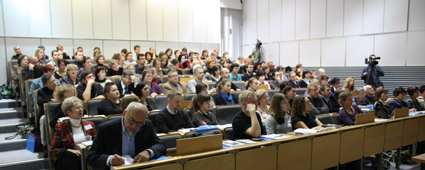 |
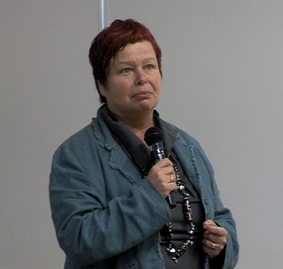 |
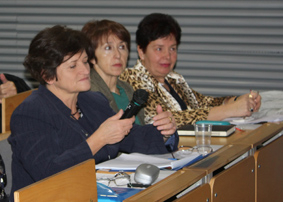 |
 |
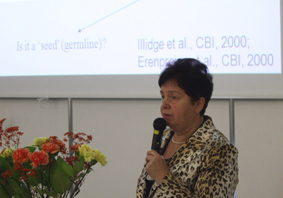 |
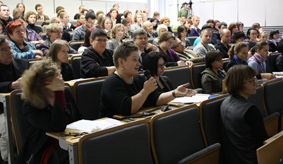 |
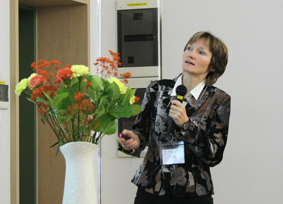 |
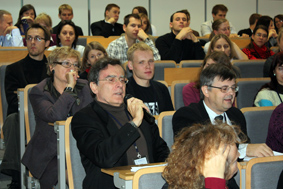 |
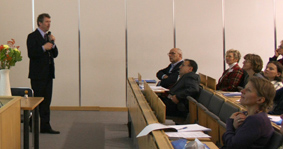 |
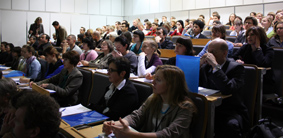 |
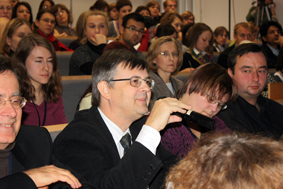 |
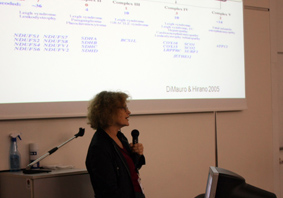 |
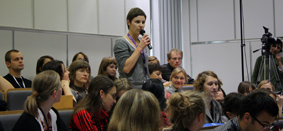 |
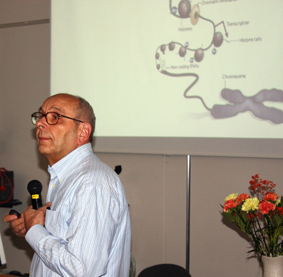 |
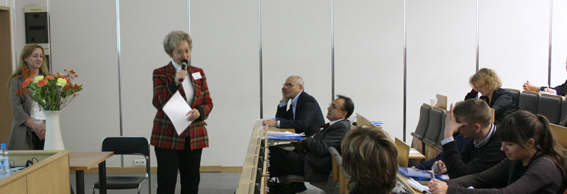 |
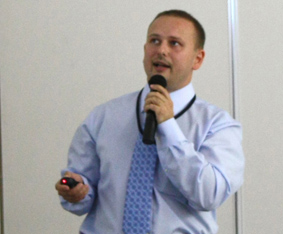 |
